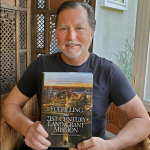 Stephen M. Gavazzi graduated in 1986 with his master’s degree in Marriage and Family Therapy prior to completing his Family Studies doctorate in 1991. Upon graduation, he accepted a position at The Ohio State University, where he has remained for the past 30 years. For many years, Steve’s scholarship remained closely connected to two of his committee members – UConn professor emeritus Steve Anderson and UConn professor emeritus Ron Sabatelli – with a strong focus on issues pertaining to families with adolescents. After publishing 50+ articles on this topic, Steve’s first book – Families with Adolescents: Bridging the Gaps Between Theory, Research, and Practice – was published by Springer Press in 2011. His service in two administrative positions – as Director of The Ohio State University’s Center for Family Research and Dean of Ohio State’s Mansfield regional campus – ignited an interest in the topic of land-grant universities, with a special emphasis on the community engagement activities that are embedded in the land-grant mission. Steve’s first book on this topic – Land-Grant Universities for the Future: Higher Education for the Public Good – was co-authored by West Virginia University president E. Gordon Gee and published by Johns Hopkins University Press in 2018. A second book on the public’s perceptions of higher education – titled What’s Public About Public Higher Ed? – written by Gavazzi and Gee will be published by Johns Hopkins University Press in early fall 2021. Most recently, Steve has focused his attention on the debt that land-grant universities across the country owe to Native American tribes. That is, the “land” in “land-grant” came from broken treaties and acts of violence perpetrated on Indigenous peoples. This “Original Sin” of the land-grant universities is the subject of several new publications that Steve has written. Currently, he is leading a research project that engages Tribal Leaders in discussions about the reparative actions that land-grant universities can take in service to healing the harm caused by these historical atrocities.
Stephen M. Gavazzi graduated in 1986 with his master’s degree in Marriage and Family Therapy prior to completing his Family Studies doctorate in 1991. Upon graduation, he accepted a position at The Ohio State University, where he has remained for the past 30 years. For many years, Steve’s scholarship remained closely connected to two of his committee members – UConn professor emeritus Steve Anderson and UConn professor emeritus Ron Sabatelli – with a strong focus on issues pertaining to families with adolescents. After publishing 50+ articles on this topic, Steve’s first book – Families with Adolescents: Bridging the Gaps Between Theory, Research, and Practice – was published by Springer Press in 2011. His service in two administrative positions – as Director of The Ohio State University’s Center for Family Research and Dean of Ohio State’s Mansfield regional campus – ignited an interest in the topic of land-grant universities, with a special emphasis on the community engagement activities that are embedded in the land-grant mission. Steve’s first book on this topic – Land-Grant Universities for the Future: Higher Education for the Public Good – was co-authored by West Virginia University president E. Gordon Gee and published by Johns Hopkins University Press in 2018. A second book on the public’s perceptions of higher education – titled What’s Public About Public Higher Ed? – written by Gavazzi and Gee will be published by Johns Hopkins University Press in early fall 2021. Most recently, Steve has focused his attention on the debt that land-grant universities across the country owe to Native American tribes. That is, the “land” in “land-grant” came from broken treaties and acts of violence perpetrated on Indigenous peoples. This “Original Sin” of the land-grant universities is the subject of several new publications that Steve has written. Currently, he is leading a research project that engages Tribal Leaders in discussions about the reparative actions that land-grant universities can take in service to healing the harm caused by these historical atrocities.